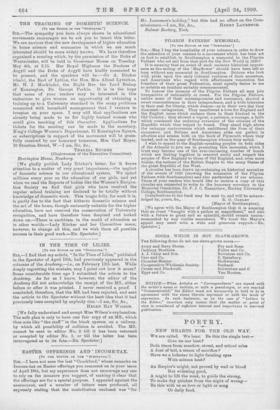THE TEACHING OF DOMESTIC SCIENCE. [To Tax EDITOR Or TEE
"SPEOTATOR,"]
SIR,—Tho sympathy you have always shown in educational movements encourages me to ask you to insert this letter. We are anxious that the new development of higher education in home science and economics in which we are much interested should be more widely known. We have therefore organised a meeting which, by the permission of the Duke of Westminster, will 'be held in Grosvenor House on Tuesday. May 4th, at 3.15. Her Royal Highness the Duchess of Argyll and the Duke of Argyll have kindly consented to be present, and the speakers will be :—Sir A. Rucker (chair), the Earl of Lytton, the Hon. Mrs. Alfred Lyttelton, Mr. H. J. Mackinder, the Right Rev. the Lord Bishop of Kensington, Dr. George Parkin. It is in the hope that some of your readers may be interested in this endeavor to give women an opportunity of obtaining a training up to a University standard in the many problems connected with household management that I venture to trespass on your space. I may add that applications are already being made to us for highly trained women who could give teaching of this character. Applications for tickets for the meeting can be made to the secretary, King's College Women's Department, 13 Kensington Square, or subscriptions in support of the movement will be grate- fully received by our honorary treasurer, Mrs. Carl Meyer, 10 Stratton Street, W.—I am, Sir, &c., THEREZA. RUCKER (Chairwoman of the Executive Committee). Ereringion House, Newbury.
[We gladly publish Lady Rileker's letter, for it draws attention to a matter of very great importance,—the neglect of domestic science in our educational system. We spend milliens every year on the education of our girls, and yet when we read the Reports of bodies like the Women's Emigra- tion Society we find that girls who have received the regular school training are declared to be totally without knowledge of domestic work. This tragic folly, for such it is, is partly due to the fact that hitherto domestic science and the art of the home, though eminently suitable for the higher education, have not reeeived the consecration of University recognition, and have therefore been despised and looked down on.—There in snobbism in the world of education as in other worlds.—Lady 'tacker and her Committee mean, however, to change all this, and we wish them all possible success in their good work.—En. Spectator.]






















































 Previous page
Previous page